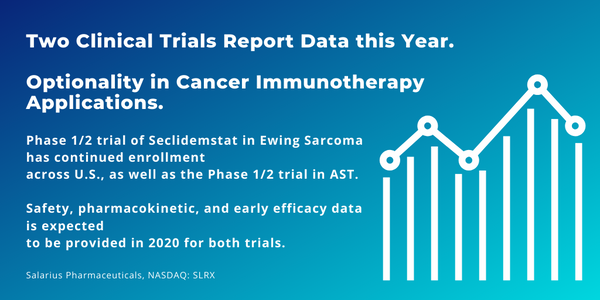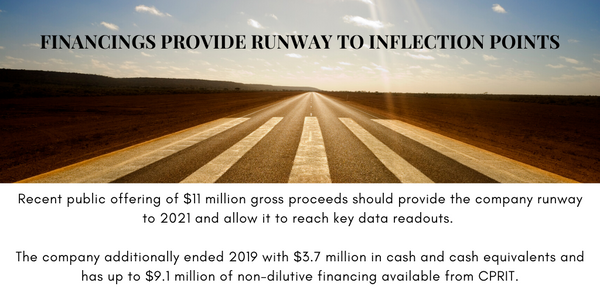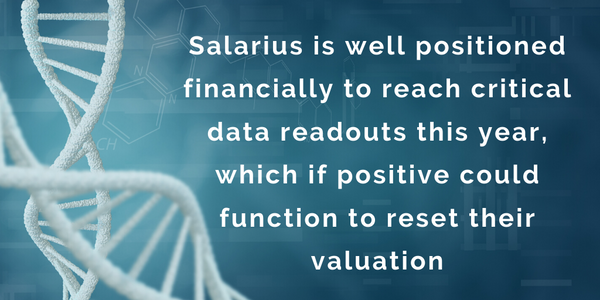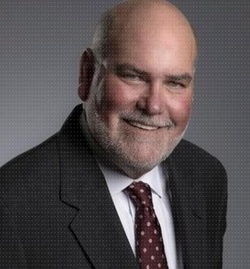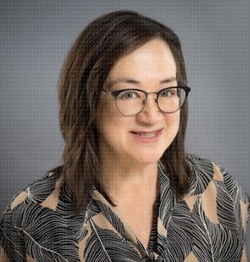
- Salarius Pharmaceuticals advanced dose escalation in Ewing Sarcoma trial with early stage clinical readouts in 2020. The company reached the sixth level dosing cohort in its phase 1/2 study of Seclidemstat in Ewing sarcoma upon the Safety Committee Review. Seclidemstat has received the Fast Track Designation by FDA for relapsed or refractory Ewing sarcoma. The company previously has received Orphan Drug Designation and Rare Pediatric Disease Designation, which should position Salarius for expedited FDA drug development and review processes. The company expects to reach the Maximum Tolerated Dose (MTD) in mid-2020. Salarius Pharmaceuticals anticipates releasing data from its Ewing sarcoma clinical trial and second clinical trial in advanced solid tumors (AST) in 2020, which we view as key inflection points for the stock.
- Financings provide runway to inflection points. Recent public offering of $11 million gross proceeds should provide the company runway to second half of 2021 and allow it to reach key data readouts. The company ended the quarter with $9.65 million in cash and cash equivalents and has up to $9.1 million of non-dilutive financing available from Cancer Prevention and Research Institute of Texas (CPRIT).
- COVID-19 has not materially interrupted business. To date there have been minimal interruptions in Salarius’ operations including the Seclidemstat trials, however we note this might change given the ever-evolving situation and management has guided they will communicate material changes to shareholders.
- Strengthened IP portfolio with company exploring checkpoint inhibitor applications. Recent paper titled “The novel reversible LSD1 inhibitor SP-2577 promotes anti-tumor immunity in SWItch/Sucrose-NonFermentable (SWI/SNF) complex mutated ovarian cancer” was published on bioRxiv.com demonstrating potential for seclidemstat to be used in combination with checkpoint inhibitors (market projected to be $29.3 billion by 20231 ). Salarius continued to strengthen its IP around Seclidemstat, now holding over 22 patents in U.S. and abroad and has 11 pending applications. These patents and patent applications relate to Seclidemstat or structurally similar compounds, which we view as strengthening the overall potential commercialization opportunities of Salarius, assuming efficacy data around Seclidemstat.
- Small capitalization life science equities tend to trade on fundamentals of their business and trial results more than macro issues. As such, we view the upside potential of the stock much more dependent on their upcoming trial data in the growing epigenetics sector, versus macroeconomic headwinds. Given the early stage of the company, investment is suited for sophisticated institutional investors or high-risk tolerant retail investors in our view. Our valuation model indicates a fair value of $4.50 per share, which is contingent on positive phase 1/2 trial results in Ewing sarcoma.

For the first quarter ending March 31st, 2020, Salarius Pharmaceuticals reported grant revenue of $1,132,830, as compared to $ 655,635 for the same period last year. Total operating expenses were $3,502,388, compared to $2,188,419 in Q1 2019 , a 60% increase, primarily due to an increase of $943,442 in research and development expenses resulting from increased clinical expenses and drug manufacturing costs, and a $370,527 increase in general and administrative expenses resulting from the company’s transformation into a public company and increased personnel expenses. Salarius’ net loss for the three months ending March 31st, 2020 was $2,083,816, or $0.22 per basic and diluted share, compared to a net loss of $1,522,076, or $0.64 per basic and diluted share in year-ago period. We expect research and development expenses to continue to increase, as the company develops its early stage epigenetics pipeline and explores additional indications
As of March 31st, 2020, Salarius’ cash and cash equivalents were equal to $9,646,940, compared to $3,738,900 as of December 31st, 2019. Total current assets increased by 132% to $10,884,429 on March 31st, 2020; total liabilities decreased from $3,313,544 at year-end 2019 to $2,062,761, with the company having no long-term debt. On February 11th, 2020, Salarius completed a public offering with total gross proceeds of approximately $11 million, which will be used for general working capital purposes and is expected to fund the company to the second half of 2021 and beyond key clinical data releases that may function as key catalysts for shares. Salarius is also eligible for up to $9.1 million from CPRIT. Overall, we view Salarius as well positioned financially to reach critical data readouts this year, which if positive could function to reset their valuation
Salarius Pharmaceuticals, Inc. is a clinical-stage biotechnology company focused on developing effective epigenetic-based cancer treatments for indications with high unmet medical need. In some cancer’s gene expression is dysregulated and incorrectly turns genes on or off leading to cancer progression. Drugs that can safely modify the activity of these epigenetic regulators may correct the gene changes that are driving the cancer progression. Salarius is running two Phase 1/2 clinical trials with its lead candidate, Seclidemstat, a small molecule oral therapeutic that targets LSD1, a key regulator of gene expression involved in promoting development of several cancer types which could potentially be used in combination with other approved agents like checkpoint inhibitors, a large market opportunity. As such, Salarius has been awarded an $18.7 million CPRIT grant to fund development of its LSD1 program ($9.1 million available as of December 2019). Salarius is first targeting a rare pediatric disease, Ewing sarcoma, as part of its speed to market strategy. Due to the high unmet need for novel Ewing sarcoma treatment options, Salarius has received and continues to receive funding from the National Pediatric Cancer Foundation and also has been deemed eligible for a Pediatric Priority Review Voucher, which can be potentially sold to another pharmaceutical company for over $100 million if it’s in line with historical rates, or be used by Salarius to receive expedited review on another drug program. We view Salarius as providing investors a unique, high risk high reward small capitalization epigenetics investment opportunity, with its differentiated potential treatments. Seclidemstat is a novel, reversible, and non-competitive LSD1 inhibitor to treat several types of cancer. Salarius’ strategy consists of a speed to market and market expansion, an approach that has been successfully implemented by other biotech companies (e.g. Epizyme). Speed to market is achieved by treating Ewing sarcoma, a rare bone and soft tissue cancer, which affects children and adolescents with no treatment options beyond standard chemotherapy, as well as disfiguring surgery or radiation. There are no second-line treatment options for patients who have failed these first line therapies and 70% of patients with relapsed/metastatic disease will succumb to the disease.2 Market expansion is achieved by studying Seclidemstat’s potential as a more effective and less toxic treatment option in large market indications including prostate, breast, and ovarian cancers. Seclidemstat is well positioned and differentiated by its reversible mechanism and comprehensive inhibition of enzymatic and scaffolding properties, which can potentially enhance the therapeutic activity and improve potential efficacy in a broad range of cancer types. The company is conducting two open-label and dose-ranging Phase 1/2 trials of Seclidemstat in Ewing sarcoma and Advanced Solid Tumors(AST) with expected readouts in 1H 2020 and 2H 2020. Based on analysis of phase 1 Pharma acquisitions and R&D collaborations over the past five years, the company’s value could reset via upfront and/or royalty/milestone payments if either trial is successful. Salarius is additionally one of the few pure play public investment opportunities within the rapidly growing epigenetics sector, the other public ones being Epizyme (EPZM), Oryzon Genomics (ORY.MC) and Constellation Pharmaceuticals, Inc. (CNST) with other epigenetic drugs being developed within larger diversified biotechnology companies (e.g. Celgene, GSK). We thus view Salarius as presenting a relatively unique high-risk high reward investment opportunity within the small capitalization epigenetics sector.
1 Based on average selling price in Salarius Investor Presentation
2 Pishas, Kathleen I and Stephen L Lessnick. “Recent advances in targeted therapy for Ewing sarcoma” F1000Research vol. 5 F1000 Faculty Rev-2077. 25 Aug. 2016
- Salarius’ candidate products are still in their early stages of clinical development, and subsequent clinical research may take years and require substantial expenditures and even if financed the results may ultimately prove unsuccessful.
- Ewing Sarcoma phase 1 trial human data may not prove successful or not be as the company anticipates. Current data is based on animal studies.
- Reliance on government funding for its programs may add uncertainty to the company’s research and commercialization efforts.
- The company is highly dependent on management and its advisors. Therefore, a loss of service of senior management or key employees could harm its ability to develop and commercialize its product candidates given the company’s smaller size.
- Salarius relies on patents for its product candidates and any future product candidates. It may not be able to compete effectively if its intellectual property proves insufficient.
- The company’s lead candidates, if approved, will likely face competition within the pharmaceutical industry. Although it is focused on a specific therapy, close competition could lead to reduced market share for its product candidates and put downward pressure on pricing, harming the company’s business, financial position, operating results, and prospects.
- As a newly public and small company, Salarius will spend substantial time and significant amounts of funding to comply with public company regulations and maintain effective internal controls.
- The FDA's marketing approval process is lengthy, time-consuming, and inherently unpredictable even with the expedited pathway investors will need a long horizon to potentially realize profits, albeit with trial/data milestones over that period if Salarius is successful.
- The company will require additional financing to successfully commercialize its pipeline, there is no assurance the company can raise financing or that the financing will be at attractive terms.
- Salarius currently is underfollowed by sell-side and investors and has very low trading volume, this could limit investors ability to increase their ownership or sell some of their positions.
- Company has incurred losses since its inception, and significant further operating losses are expected in foreseeable future. The company may never generate profits.
- The company’s future revenue is dependent on market acceptance, pricing, reimbursement and numerous other difficult to estimate factors.
This list of risk factors is not comprehensive. For a full list, please refer to Salarius’ latest prospectus and/or annual filings.
Diamond Equity Research Disclosure
Diamond Equity Research, LLC has created and distributed this report. This report is based on information we consider reliable, including the subject of the report. This report does not explicitly or implicitly affirm that the information contained within this document is accurate and/or comprehensive, and as such should not be relied on in such a capacity. All information contained within this report is subject to change without any formal or other notice provided. Diamond Equity Research, LLC is not a FINRA registered broker/dealer or investment adviser and does not provide investment banking services and follows customary internal trading procedures pending the release of the report found on disclosure page.
This document is not produced in conjunction with a security offering and is not an offering to purchase securities. This report does not consider individual circumstances and does not take into consideration individual investor preferences. Recipients of this report should consult professionals around their personal situation, including taxation. Statements within this report may constitute forward-looking statements, these statements involve many risk factors and general uncertainties around the business, industry, and macroeconomic environment. Investors need to be aware of the high degree of risk in micro capitalization equities.
Diamond Equity Research LLC is being compensated by Salarius Pharmaceuticals, Inc. for producing research materials regarding Salarius Pharmaceuticals, Inc. and its securities, which is meant to subsidize the high cost of creating the report and monitoring the security, however the views in the report reflect that of Diamond Equity Research. All payments are received upfront and are billed for an annual or semi- annual research engagement. As of 04/15/2020 the issuer had paid us $30,000 for our services, which commenced 10/28/2019 and is billed annually. Diamond Equity Research LLC may be compensated for non-research related services, including presenting at Diamond Equity Research investment conferences, press releases and other additional services. The non-research related service cost is dependent on the company, but usually do not exceed $5,000. The issuer has paid us $2,000 for non-research related services as of 04/15/2020 consisting of presenting at an investment conference. Issuers are not required to engage us for these additional services. Additional fees may have accrued since then.
Diamond Equity Research, LLC is not a registered broker dealer and does not conduct investment banking or receive commission sharing revenue arrangements related to the subject company of the report. The price per share and trading volume of subject company and companies referenced in this report may fluctuate and Diamond Equity Research, LLC is not liable for these inherent market fluctuations. The past performance of this investment is not indicative of the future performance, no returns are guaranteed, and a loss of capital may occur. Certain transactions, such as those involving futures, options, and other derivatives, can result in substantial risk and are not suitable for all investors.
Photocopying, duplicating or otherwise altering or distributing Diamond Equity Research, LLC reports is prohibited without explicit written permission. This report is disseminated primarily electronically and is made available to all recipients. Additional information is available upon request. For further questions, please contact research@diamondequityresearch.com
Salarius' Forward-Looking Statements
This press release contains “forward-looking statements” within the meaning of the Private Securities Litigation Reform Act of 1995. All statements, other than statements of historical facts, included in this press release are forward-looking statements. These forward-looking statements may be identified by terms such as “will,” “can,”” “could,” “believe,” “feel,” “plan,” “allow,” “will,” “expect,” “provide,” “able to,” “position,” “anticipate,” “progress,” “potential,” “target,” and similar terms or expressions or the negative thereof. Examples of such statements include, but are not limited to, statements regarding: anticipated milestones from the company’s clinical development pipeline, which is led by Seclidemstat; the ongoing Seclidemstat Phase 1/2 clinical trial; the study of Seclidemstat in a second Phase 1 clinical trial in advanced solid tumors; the positioning of the company to report early patient data from both clinical trials in 2020; the company’s belief that Seclidemstat is one of only two reversible inhibitors of the epigenetic modulator LSD1 currently in human trials, and that it could have potential for improved safety and efficacy compared to other LSD1-targeted therapies; and the company’s development of Seclidemstat for several cancers with high unmet medical need, with a second Phase 1 clinical study in advanced solid tumors, including prostate, breast and ovarian cancers. Salarius may not actually achieve the plans, carry out the intentions or meet the expectations or objectives disclosed in the forward-looking statements. You should not place undue reliance on these forward-looking statements. These statements are subject to risks and uncertainties which could cause actual results and performance to differ materially from those discussed in the forward-looking statements. These risks and uncertainties include, but are not limited to, the following: the ability of the company to raise additional capital to meet the company’s business operational needs and to achieve its business objectives and strategy; the company’s ability to project future capital needs and cash utilization; available sources of cash, including from CPRIT and its equity line; future clinical trial results; that the results of studies and clinical trials may not be predictive of future clinical trial results; the sufficiency of Salarius’ intellectual property protection; risks related to the drug development and the regulatory approval process; the competitive landscape and other industry-related risks; market conditions which may impact the ability of Salarius access capital under its equity line; the possibility of unexpected expenses or other uses of Salarius’ cash resources; and other risks described in Salarius’ filings with the Securities and Exchange Commission, including those under the heading “Risk Factors.” The forward-looking statements contained in this press release speak only as of the date of this press release and are based on management’s assumptions and estimates as of such date. Salarius disclaims any intent or obligation to update these forward-looking statements to reflect events or circumstances that exist after the date on which they were made


